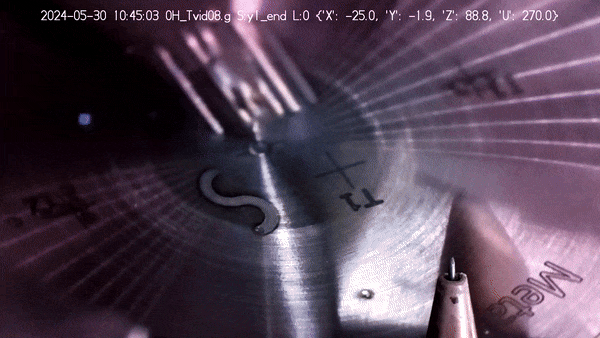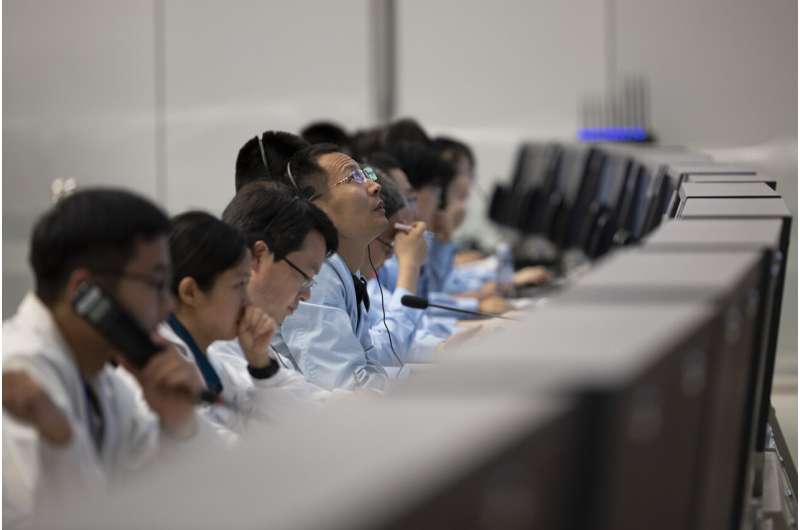
Copernical Team
Chang'e-6 Lands on Moon's Far Side to Collect Samples
 China's Chang'e-6 has successfully landed on the far side of the moon and will collect samples from this rarely explored terrain for the first time, the China National Space Administration (CNSA) announced.
Supported by the Queqiao-2 relay satellite, the lander-ascender combination of Chang'e-6 landed at the designated area at 6:23 a.m. (Beijing Time) in the South Pole-Aitken (SPA) Basin.
China's Chang'e-6 has successfully landed on the far side of the moon and will collect samples from this rarely explored terrain for the first time, the China National Space Administration (CNSA) announced.
Supported by the Queqiao-2 relay satellite, the lander-ascender combination of Chang'e-6 landed at the designated area at 6:23 a.m. (Beijing Time) in the South Pole-Aitken (SPA) Basin. Mars' subsurface ice could be a key to sustaining future habitats on other planets
 To survive on other planets, water is, of course, critical. We need it to drink, sustain crops and even create rocket fuel.
But on spaceflights, checked luggage is exorbitantly expensive. Anything heavy, especially liquids like water, is bulky and costly to haul by rocket, even to our closest interplanetary neighbors. The best plan, then, is to find water at the spacecraft's destination.
To survive on other planets, water is, of course, critical. We need it to drink, sustain crops and even create rocket fuel.
But on spaceflights, checked luggage is exorbitantly expensive. Anything heavy, especially liquids like water, is bulky and costly to haul by rocket, even to our closest interplanetary neighbors. The best plan, then, is to find water at the spacecraft's destination. China lunar probe takes off from Moon carrying samples: state media
 The ascender module of a Chinese lunar probe successfully took off from the far side of the Moon on Tuesday bearing samples, state media reported.
"The ascender of China's Chang'e-6 probe lifted off from lunar surface on Tuesday morning, carrying samples collected from the moon's far side, an unprecedented feat in human lunar exploration history," Xinhua said, citing the China National Space
The ascender module of a Chinese lunar probe successfully took off from the far side of the Moon on Tuesday bearing samples, state media reported.
"The ascender of China's Chang'e-6 probe lifted off from lunar surface on Tuesday morning, carrying samples collected from the moon's far side, an unprecedented feat in human lunar exploration history," Xinhua said, citing the China National Space Boost!
 Video:
00:02:33
Video:
00:02:33
ESA supports Europe's space transportation visionaries and entrepreneurs through Boost! This video shows just some of the companies that have received co-funding from ESA’s Boost! programme: Orbex with its Prime launcher, D-Orbit offering orbital transportation and precise payload delivery with InOrbitNow, Skyrora’s XL launcher, HyImpulse’s SL1, ForgeStar from SpaceForge preparing for manufacturing in microgravity and returning them to Earth, Isar Aerospace’s Spectrum launcher, Rocket Factory Augsburg’s RFA One and PLD Space’s Miura.
Space is open for business – space transportation gets you there!
With its Boost! programme, ESA is boosting commercial initiatives that offer transportation services to space, in
Swarm helps discover Steve's long-lost twin

Ever since aurora chasers discovered Steve, a mysterious ribbon of purple light in the night sky, scientists have wondered whether it might have a secret twin. Now, thanks to a photographer’s keen eye, and data from ESA’s Swarm satellites, we may have found it.
First metal 3D printing on Space Station
 Image:
First metal 3D printing on Space Station
Image:
First metal 3D printing on Space Station China lands a spacecraft on the moon's far side to collect rocks for study

ESA to unveil Europe's future in space at ILA 2024

The 2024 edition of the Berlin International Airshow (ILA), Germany's largest aerospace trade show, returns to Berlin ExpoCenter Airport from 5 to 9 June. The European Space Agency is taking part to present Europe's future endeavours in space and the agency’s ambitions. On the first three days, an extensive programme of sessions awaits thousands of professional attendees, while the last two days will be open to the public, welcoming visitors of all ages and backgrounds.
EarthCARE satellite launches to probe how clouds affect climate
 A rocket carrying a sophisticated satellite blasted off Tuesday from California on a mission to investigate what role clouds could play in the fight against climate change.
The EarthCARE orbiter, the result of collaboration between the European Space Agency (ESA) and Japan's JAXA space agency, launched on a SpaceX Falcon 9 rocket from Vandenberg air base at 3:20 pm local time (2220 GMT).
A rocket carrying a sophisticated satellite blasted off Tuesday from California on a mission to investigate what role clouds could play in the fight against climate change.
The EarthCARE orbiter, the result of collaboration between the European Space Agency (ESA) and Japan's JAXA space agency, launched on a SpaceX Falcon 9 rocket from Vandenberg air base at 3:20 pm local time (2220 GMT). Satellite, 'poopaganda', missiles: What's North Korea up to?
 A failed satellite launch, floating hundreds of trash-filled balloons into the South, and firing a volley of 10 short-range ballistic missiles: North Korea has had a busy week.
AFP takes a look at what's going on:
What's driving recent actions?
The flurry of activity can be seen as an angry retort from Kim Jong Un's regime to China, South Korea and Japan, experts say, specifically t
A failed satellite launch, floating hundreds of trash-filled balloons into the South, and firing a volley of 10 short-range ballistic missiles: North Korea has had a busy week.
AFP takes a look at what's going on:
What's driving recent actions?
The flurry of activity can be seen as an angry retort from Kim Jong Un's regime to China, South Korea and Japan, experts say, specifically t 



































